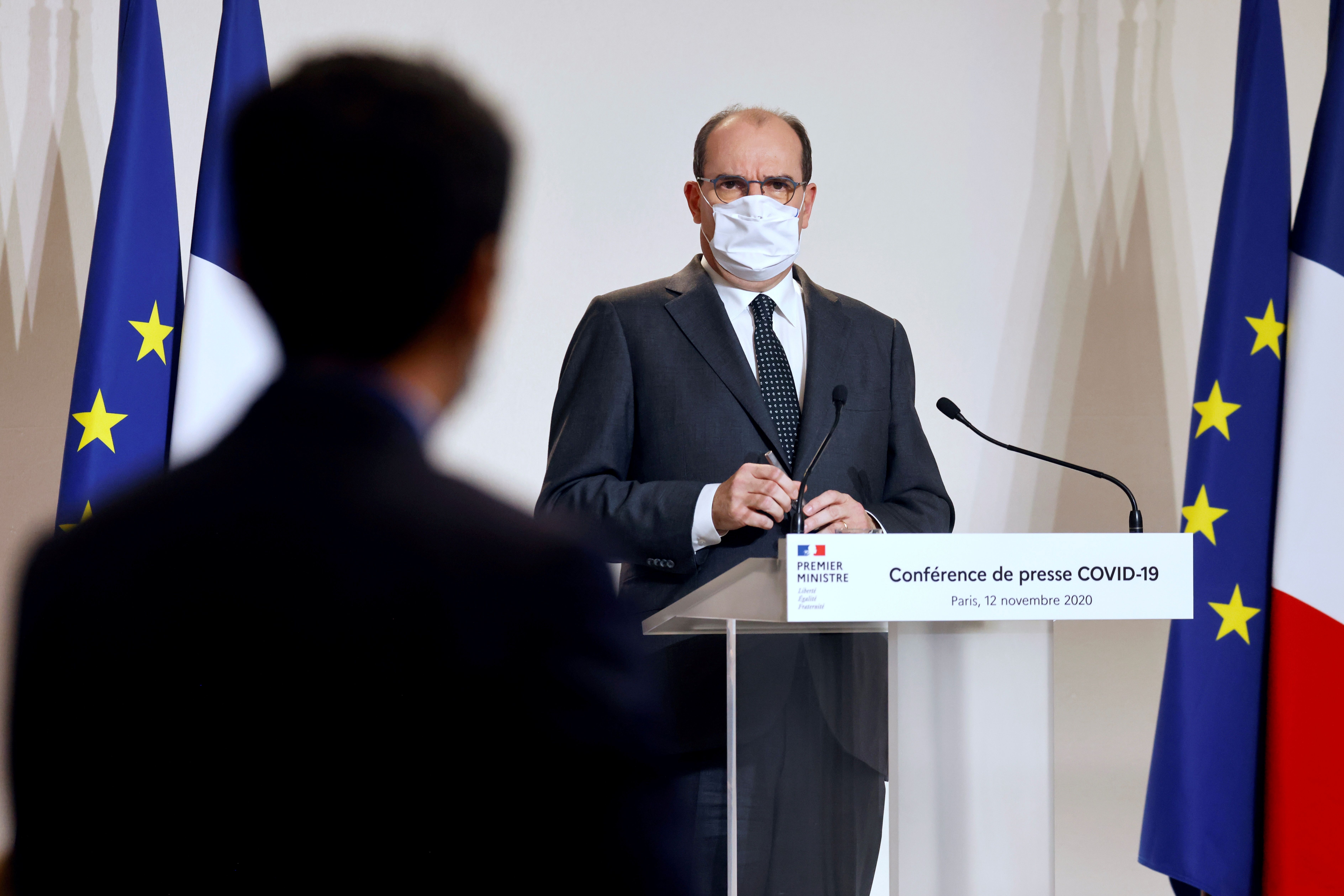France: New Lockdown Worsens Old Crises

While the first wave of the pandemic in the spring claimed 30,000 victims in France, a strict lockdown introduced from 17 March to 11 May probably prevented countless more deaths. Seeing the infection level rise again since August, the government gradually reintroduced some limitations on the local level. In mid-October, though, the daily number of detected infections began to exceed 20,000, prompting the authorities to introduce a curfew between 21:00 and 6:00 in the biggest cities and to reimpose the state of sanitary emergency, lifted in July. These measures, however, did not flatten the new infections curve, which at the end of October reached 50,000 confirmed cases daily. The government then resorted to its most stringent option, a new nationwide lockdown.
Protecting the Economy
The cost of the eight-week spring lockdown is estimated at €120 billion. According to forecasts from August, GDP loss in 2020 would have been 8–9%, but the new autumn restrictions might turn that figure into 10–11%, especially as the new lockdown will probably be extended past 1 December. While the infection rate in October and November was even higher than the peak in the spring wave, the government prioritises—along with better management of emergency units—minimisation of the economic and social impact.
Compared to the rules from spring, some modifications to the lockdown are in place. While “stay at home” is still the general order, a larger spectrum of activities is allowed to the citizens. Among others, primary and high schools remain open, online teaching being restricted to colleges and universities. It is reckoned that closing schools in spring caused a disproportionate amount of economic damage, as parents were unable to work and the social isolation of youth living in suburbs deepened. Schools are subject to special sanitary rules regarding hygiene, physical distancing, airing-out classrooms, etc. These rules are difficult to introduce in many places, however, because of a lack of classroom space and teachers. The government has also taken a risky decision, although justifiable for humanitarian reasons, to allow visits in retirement homes and prisons.
Furthermore, many sectors of the economy (such as construction and some services) that were closed from March to May, remain open. Early November forecasts show that economic activity will fall by 12%, compared to 31% in spring. To mitigate the recession, the French authorities have decided to deploy an additional assistance package. Since March, €470 billion has been allocated for this purpose, including €100 billion for a two-year recovery plan. The Ministry of Economy and Finances anticipates that each month of the new lockdown will cost around €15 billion. Like in spring, part of the plan funds will be used to pay salaries to those who cannot work under the quarantine conditions. It is estimated that—due to the milder lockdown rules—the number of those entitled to this allocation will be lower (just over 2 million compared to 8.6 million in spring). Enterprises with fewer than 50 employees, as well as those operating in tourism, sport, culture, and the self-employed, will not have to pay social contributions. Companies in difficulty are entitled to ask for a suspension of tax obligations. Another €6 billion will be provided to the support fund for small and medium-sized enterprises (SMEs) to compensate the decrease in turnover (allocations between €1,500 and €10,000). The state will continue to guarantee loans for businesses (since March, those guarantees have amounted to €123 billion for 600,000 companies). In extreme cases, the state will continue to give loans directly.
The government also granted additional help to the public health service. Back in September, it informed that France would increase expenses in this sector by €10 billion (7.6% higher) compared to the previous version of the 2020 budget. Part of this sum should be dedicated to long-awaited pay rises for medical personnel and to prepare the system for the employment of an additional 15,000 employees. With the second wave under way, an additional €2.5 billion has been proposed by Health Minister Olivier Véran. That money should help create an additional 4,000 hospital beds and ensure that 12,000 recovery beds are available throughout the country (6,000 now). The opposition accuses the government of being overly optimistic when infection rates slowed over the summer, leading to insufficient preparation of the health service for the autumn and winter spikes.
Waves of Crises
The government’s anti-COVID-19 actions were hindered by the terrorist attacks that took place in France in October. The perpetrators appear to have been individually radicalised and not formally part of any group. It is possible, however, that the difficult social and economic situation in the country played a role in their radicalisation. In addition to the discussion around France on the necessity to fight Islamism, the government faces the need to fight multiple crises simultaneously—the pandemic, social anxiety and economic problems, and security (terrorism). It fears that the respect of lockdown measures could be less strict than in spring. Aiming at guaranteeing the public order, it has increased the number of military personnel patrolling French cities from 3,000 to 7,000. Irregular immigration should be restrained by the doubling of French border guards. The Ministry of Internal Affairs also wants to deport around 200 people who, in the opinion of the Ministry’s head, Gérald Darmanin, pose a direct danger.
Compared to the spring, a portion of the public, including some SME owners—an important part of Macron and his party’s (LREM) base—is less keen to accept the new limitations. Protests by shopkeepers and service point owners are very vocal. They argue that the restrictions favour big retailers, especially global companies like Amazon, often accused in France of tax evasion. The government, though, has refused to soften the measures and ordered closed all stalls in supermarkets that do not offer essential products. This decision not only hasn’t calmed the owners of small shops, but also probably deepens the recession. The prohibition on attending religious ceremonies is equally controversial.
Conclusions and Prospects
The second national lockdown and public tensions are a serious challenge for the newly formed government of Jean Castex. Its priority should be implementing the recovery plan, paving the way for the green economy of the future, and winning new voters to Macron and LREM before the 2022 elections, allowing the president to focus on foreign policy, the deepening of EU integration, and so called “regalian functions” (e.g., reinforcing secularism). Instead, both Macron and Castex face the need to do all that and keep citizens safe and feeling secure. Castex is less efficient than his predecessor, Edouard Philippe, in mobilising the parliamentary majority and keeping the government under control. Macron remains hostage to Castex’s success or defeat, so it is in the president’s interest to use all his authority to support the prime minister.
In limiting the freedom of movement, the government can only temporarily facilitate the fight against terror and focus the attention of society away from this problem. The very unclear end to the health crisis—exacerbated by the autumn and winter flu season, lack of a ready vaccine or effective remedies—only deepens people’s irritation and uncertainty. The simultaneous health and security crises can reinvigorate the opposition, which are attacking the government far more viciously than in the spring.
The scope of the economic crisis will push France to demand an extension to the suspension of EU budget rules. It may also demand the enlargement of the Next Generation EU recovery plan, hoping that the funds that have already been agreed will be available sooner. In response to the security crisis, France will return to its past proposals: creation of a European border guard and unified immigration service, reinforcement of intelligence cooperation, and civil protection. France may also propose to elaborate a mechanism for permanent control of border protection, which could make suspension of Schengen by a zone member easier in case of non-compliance with treaty obligations.


